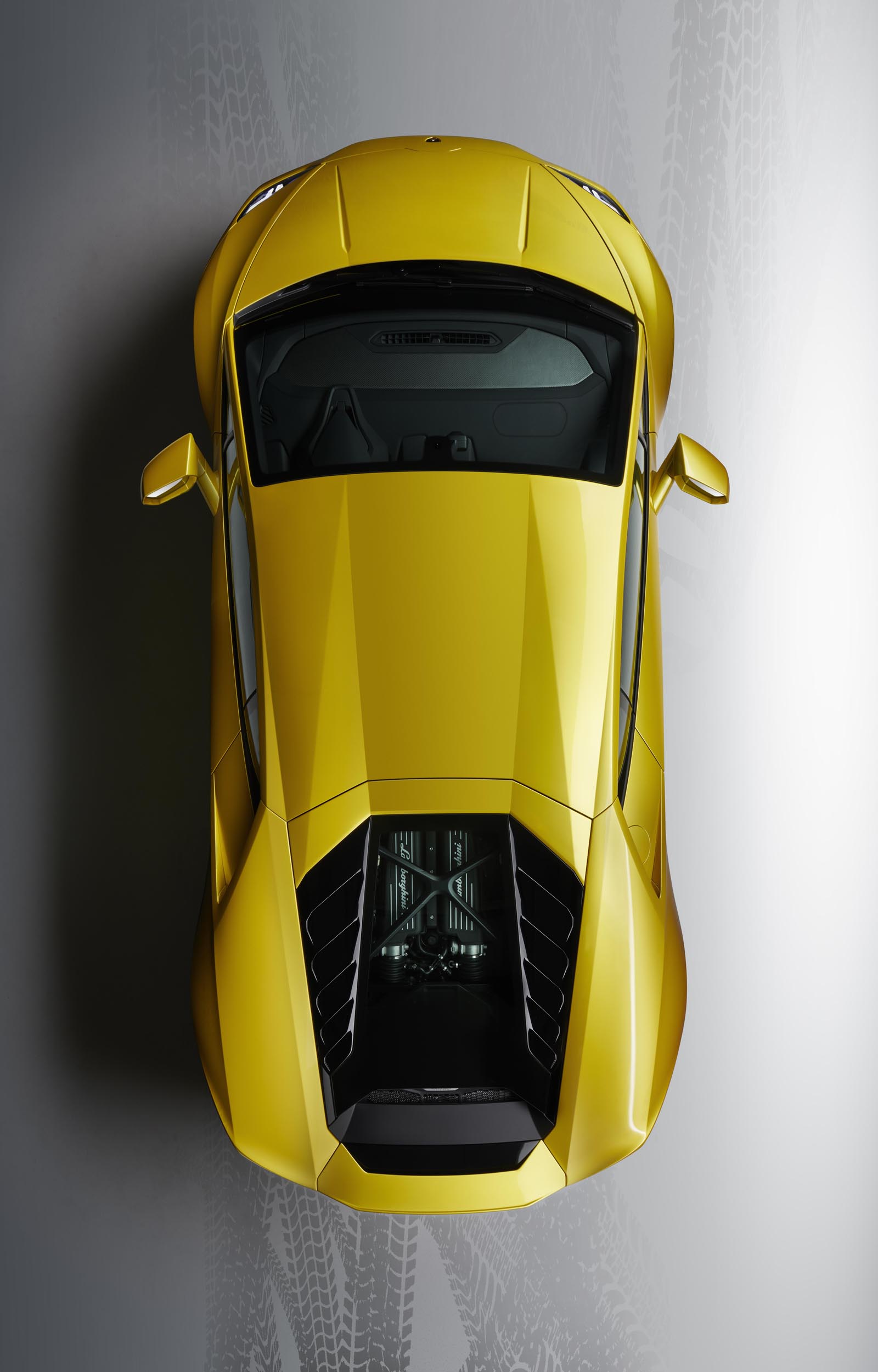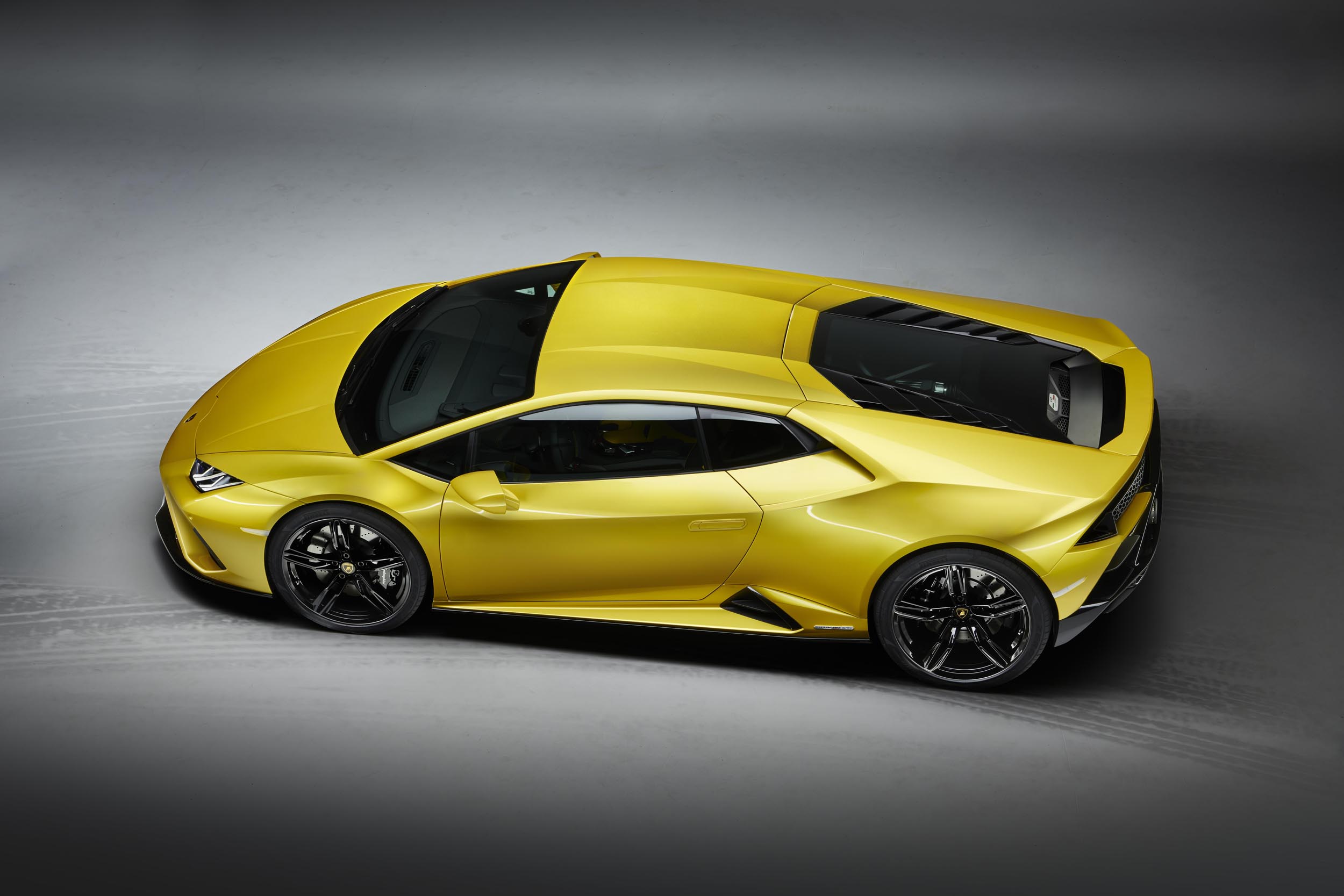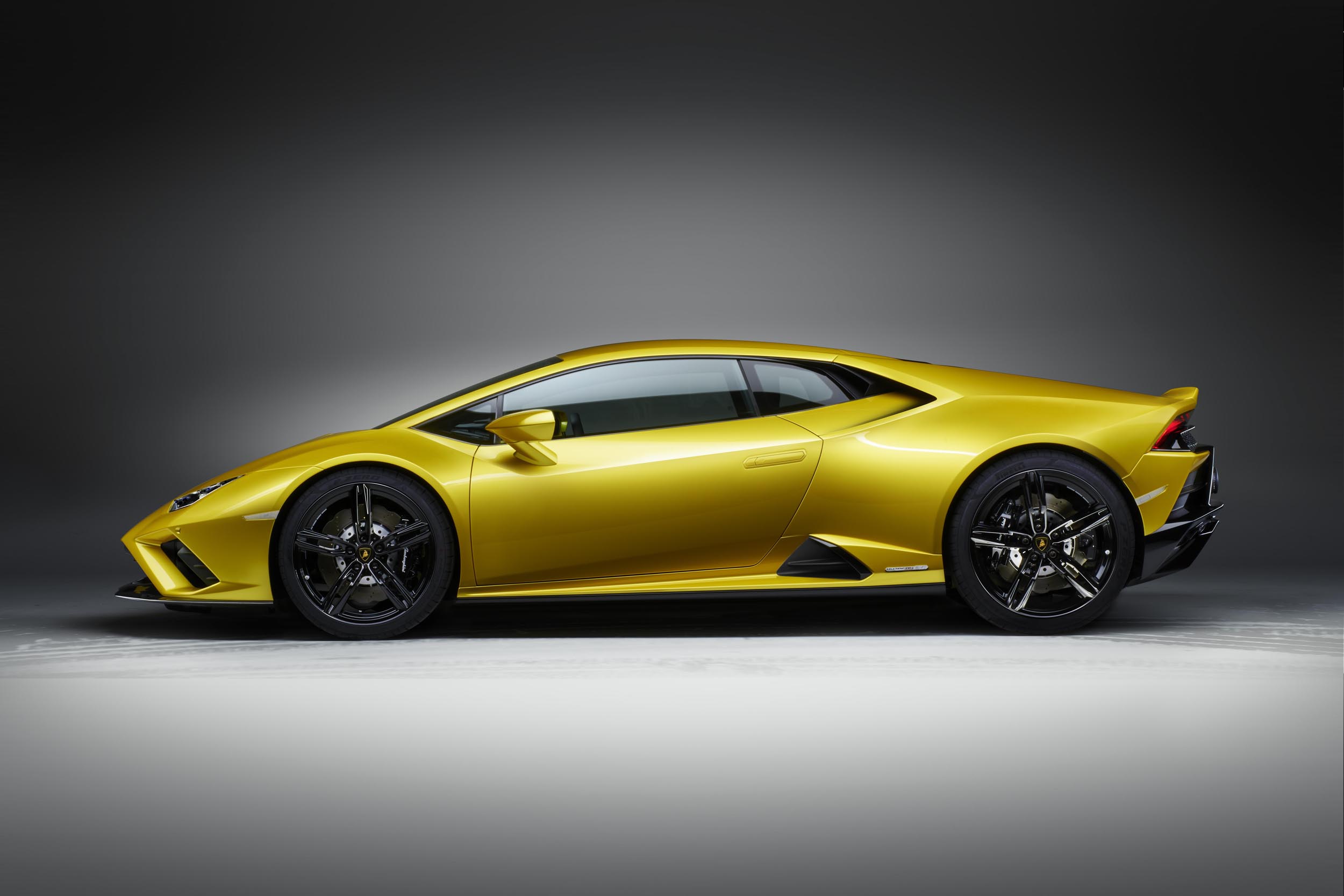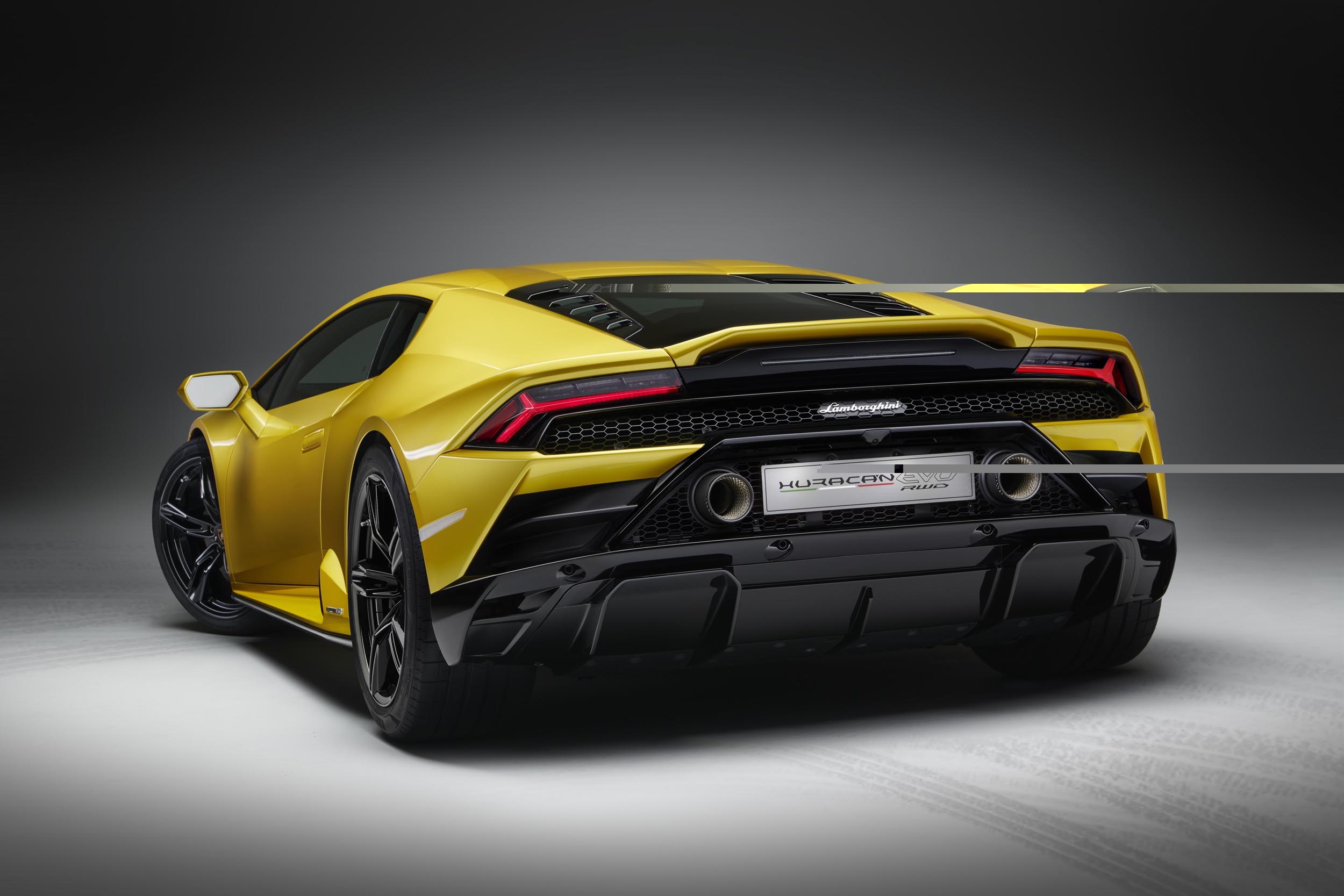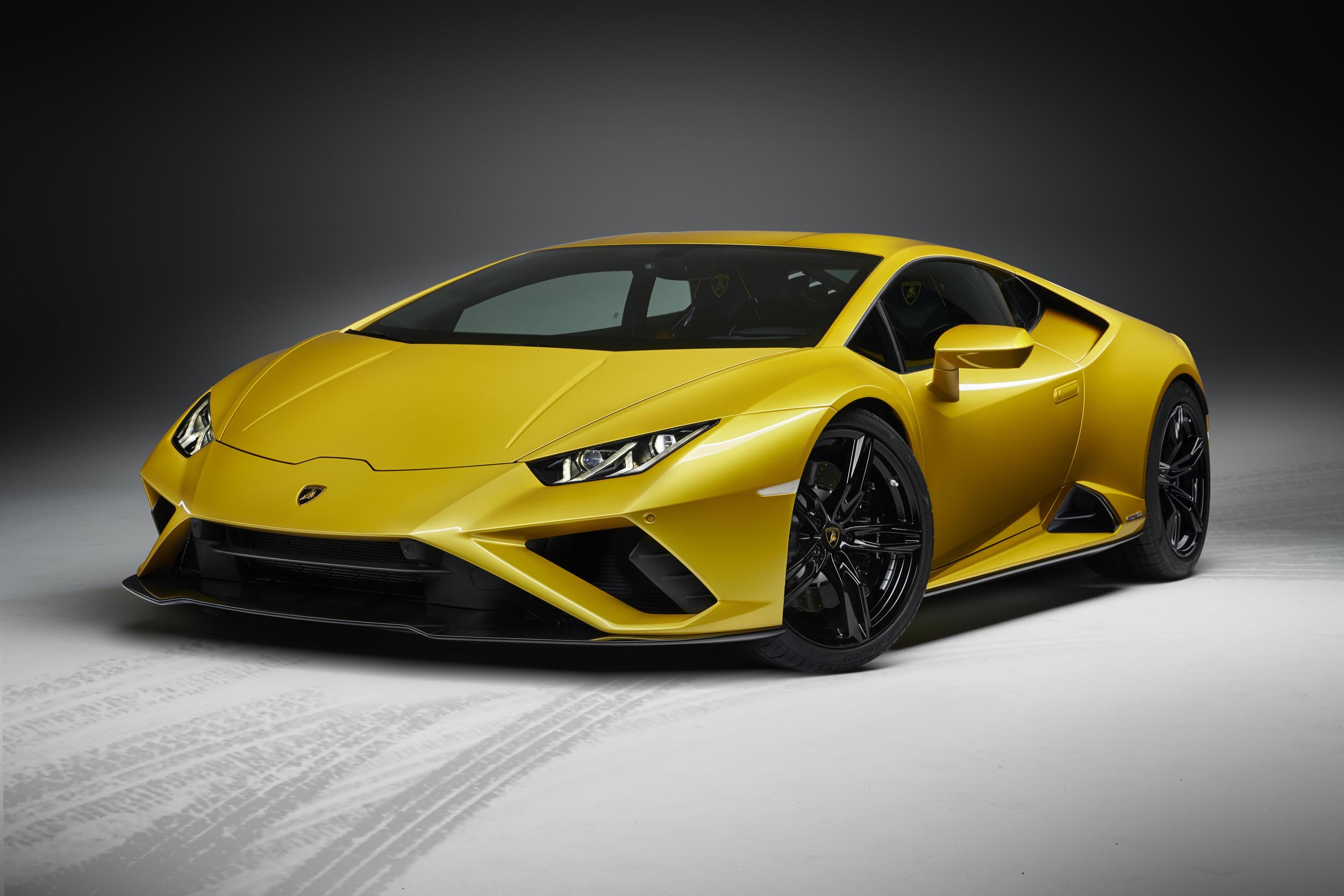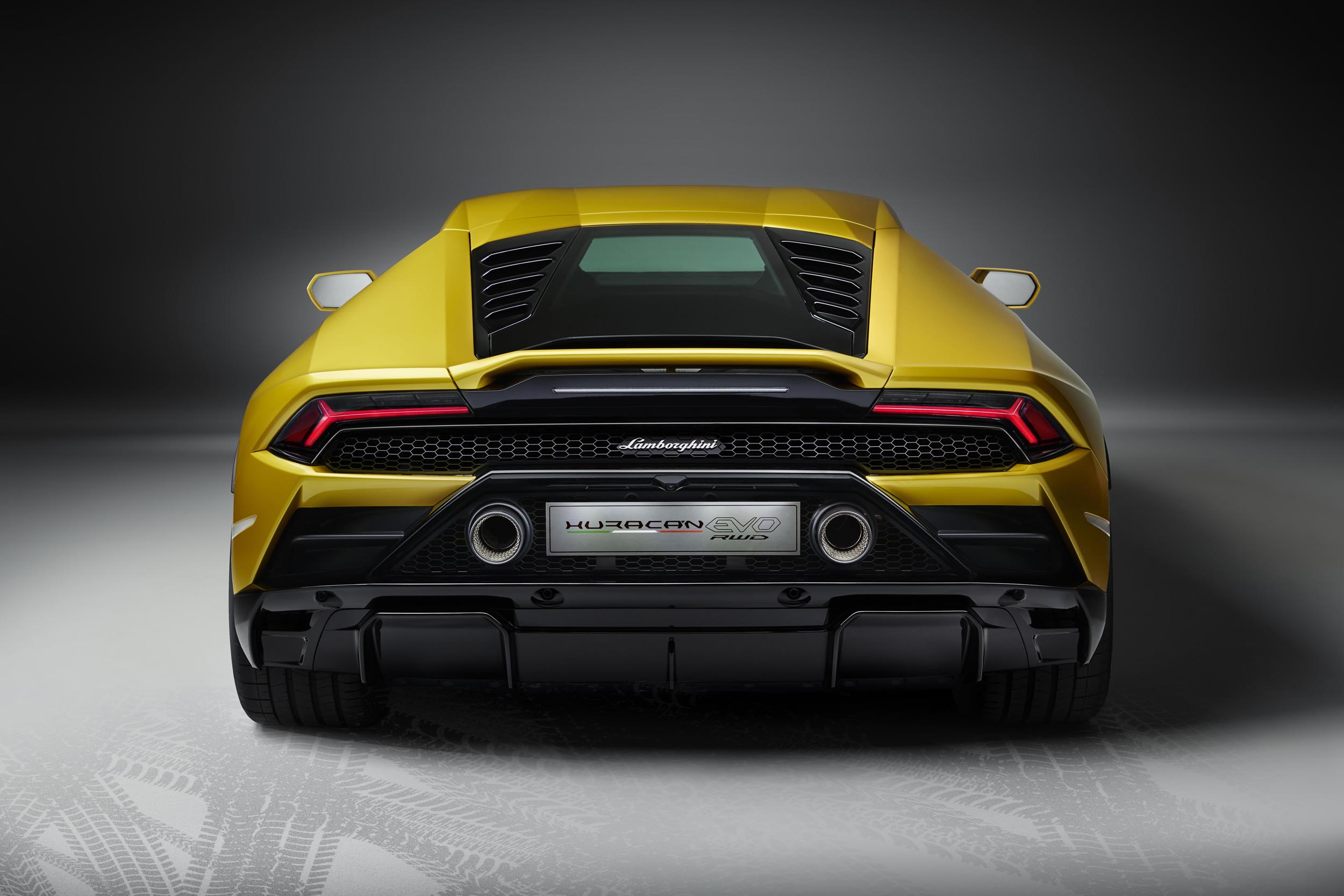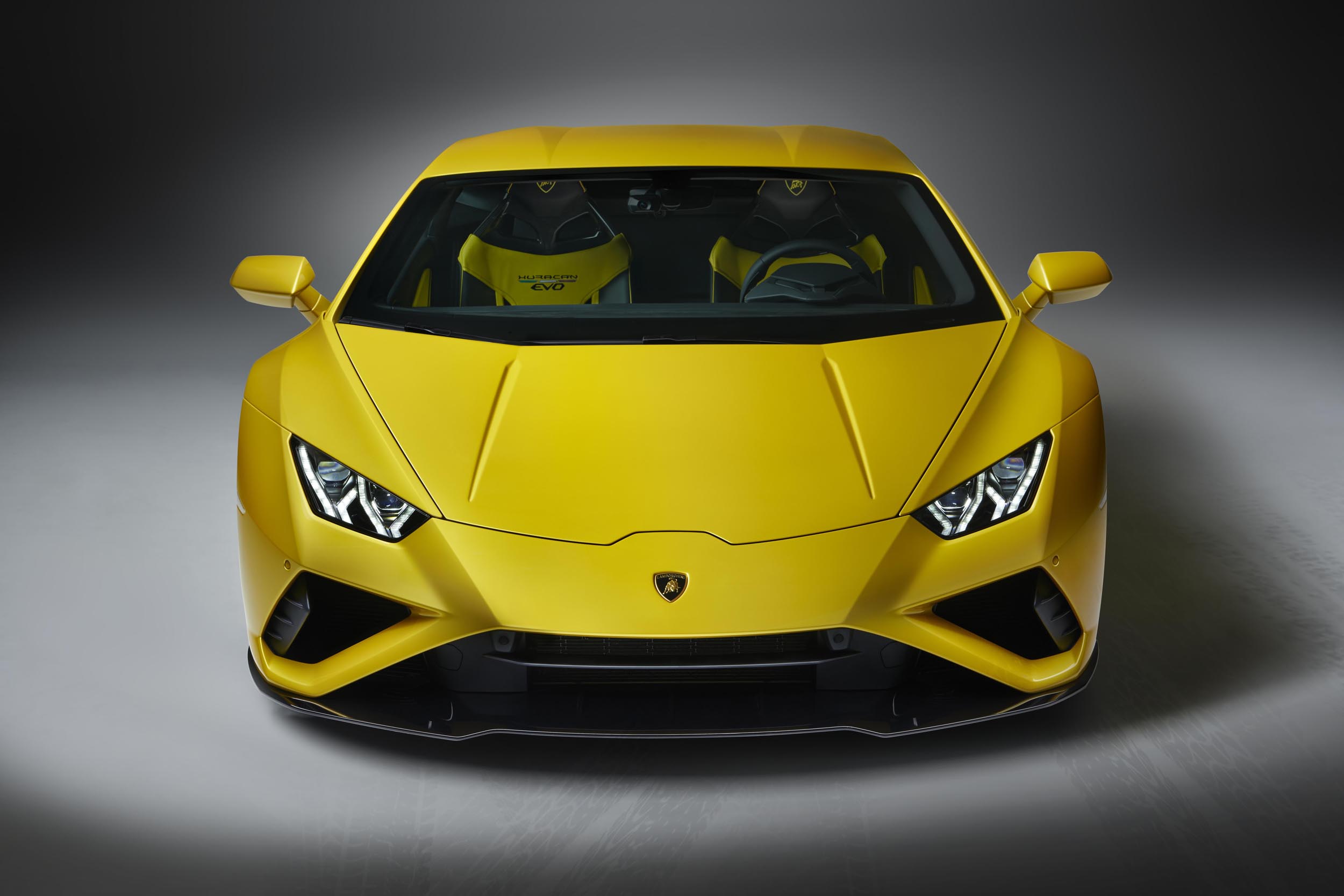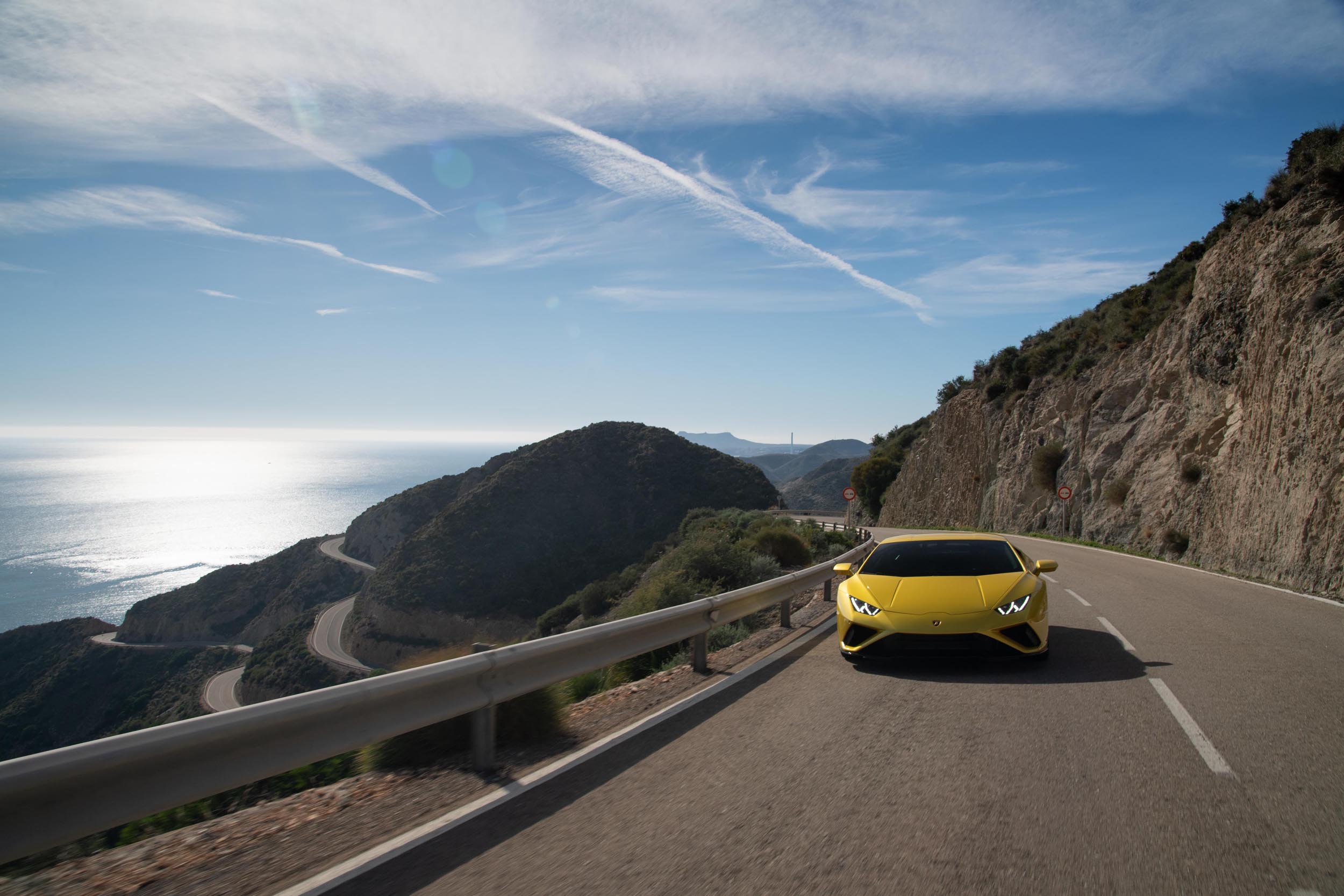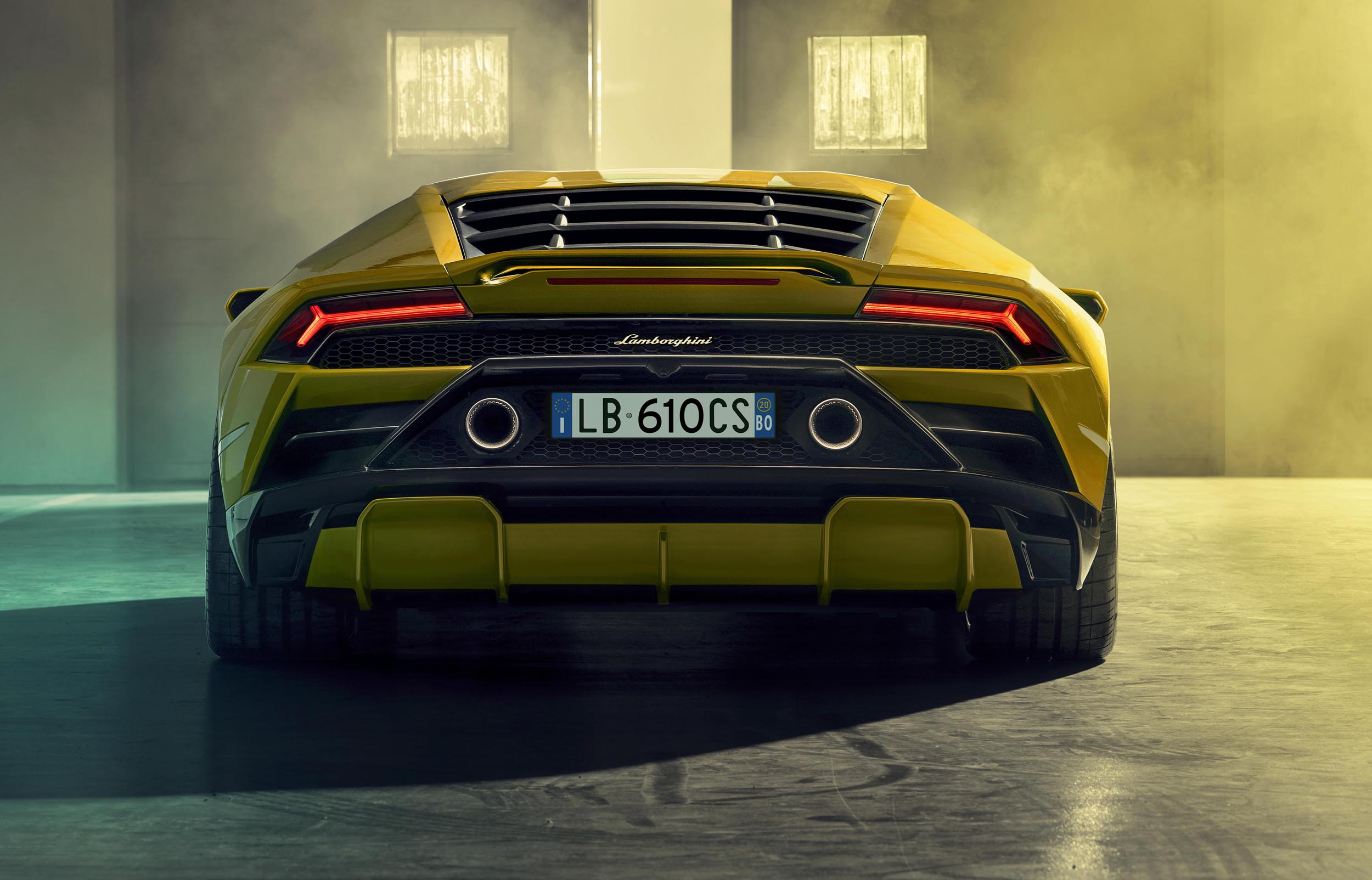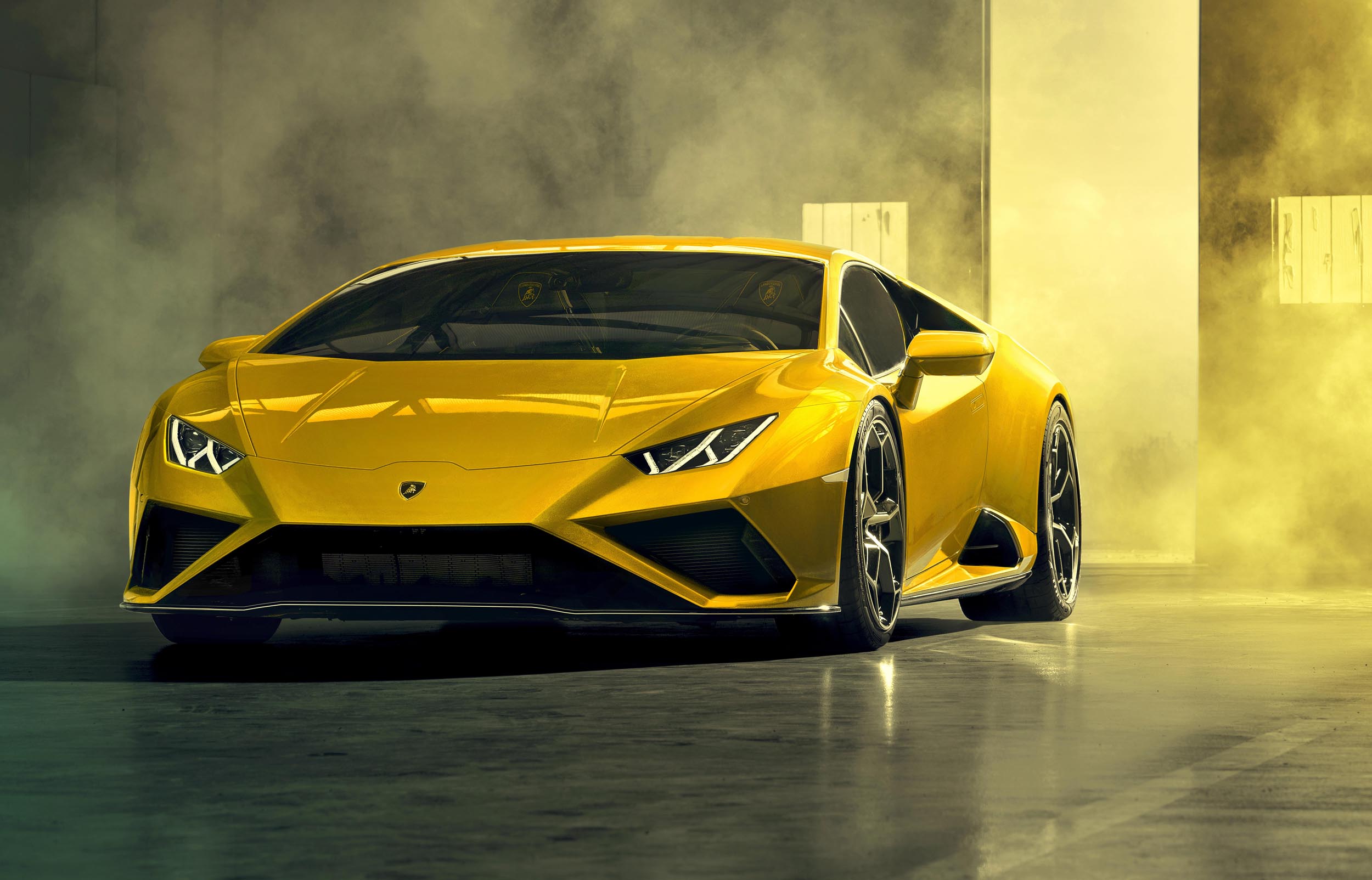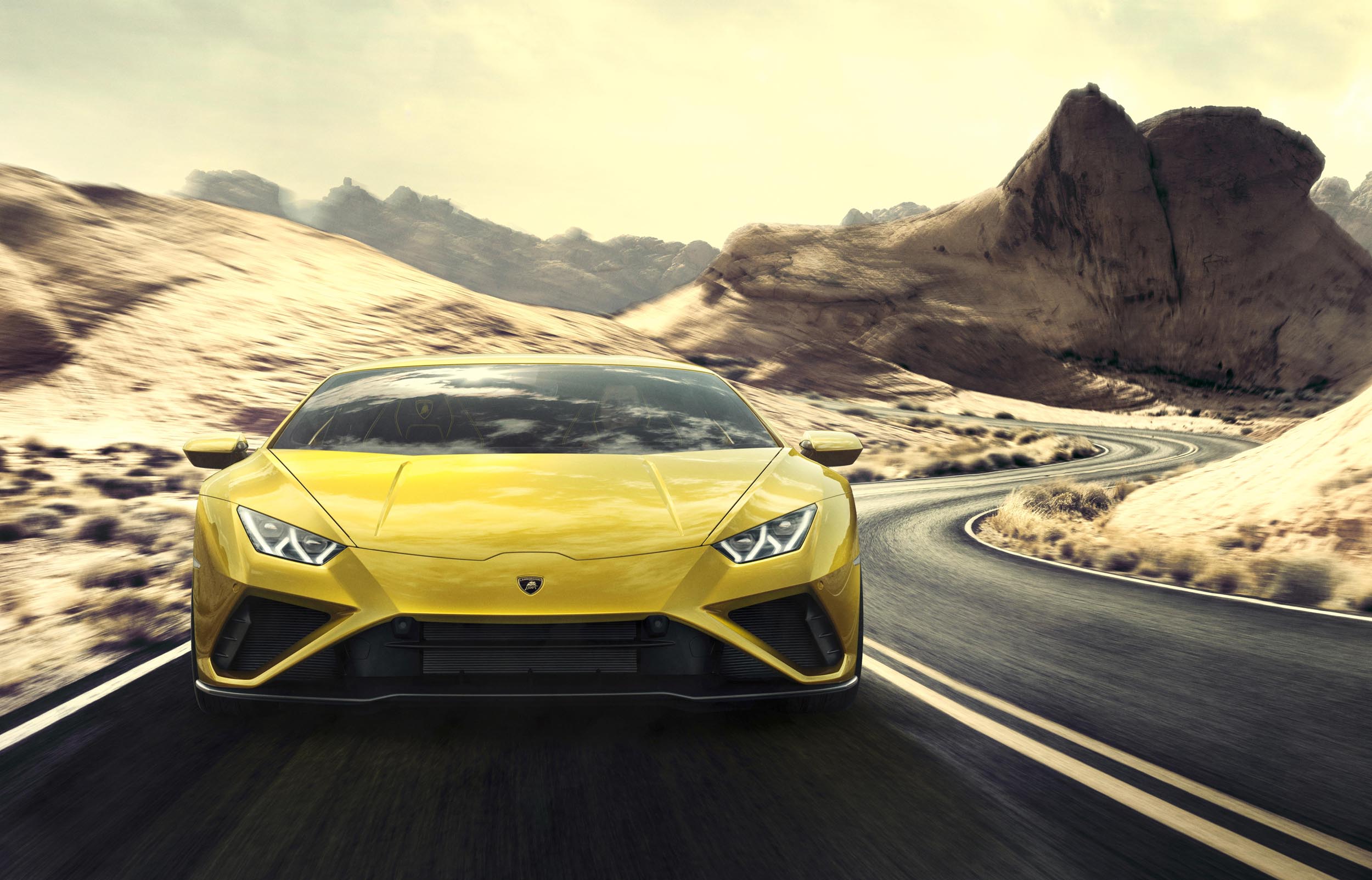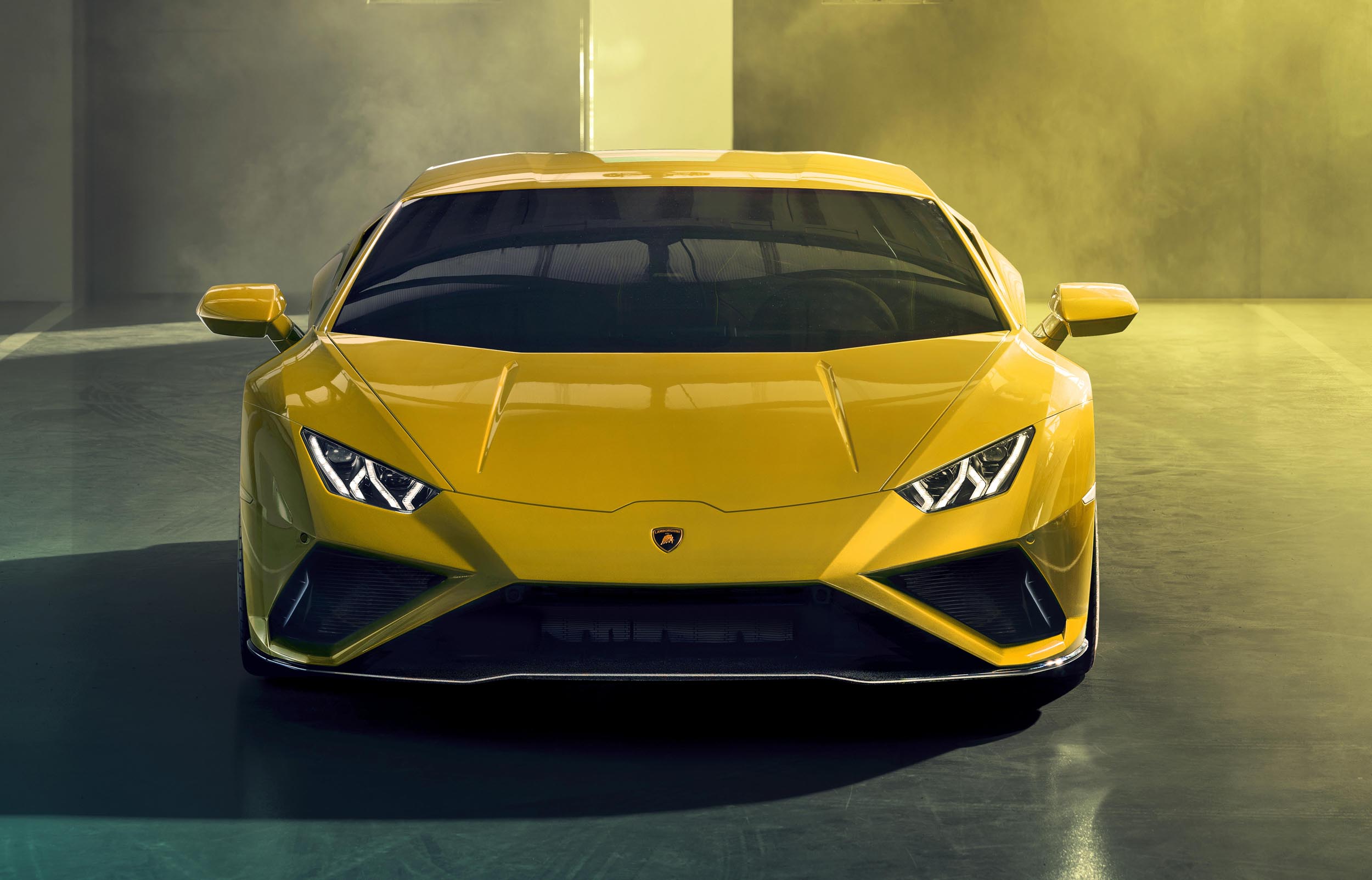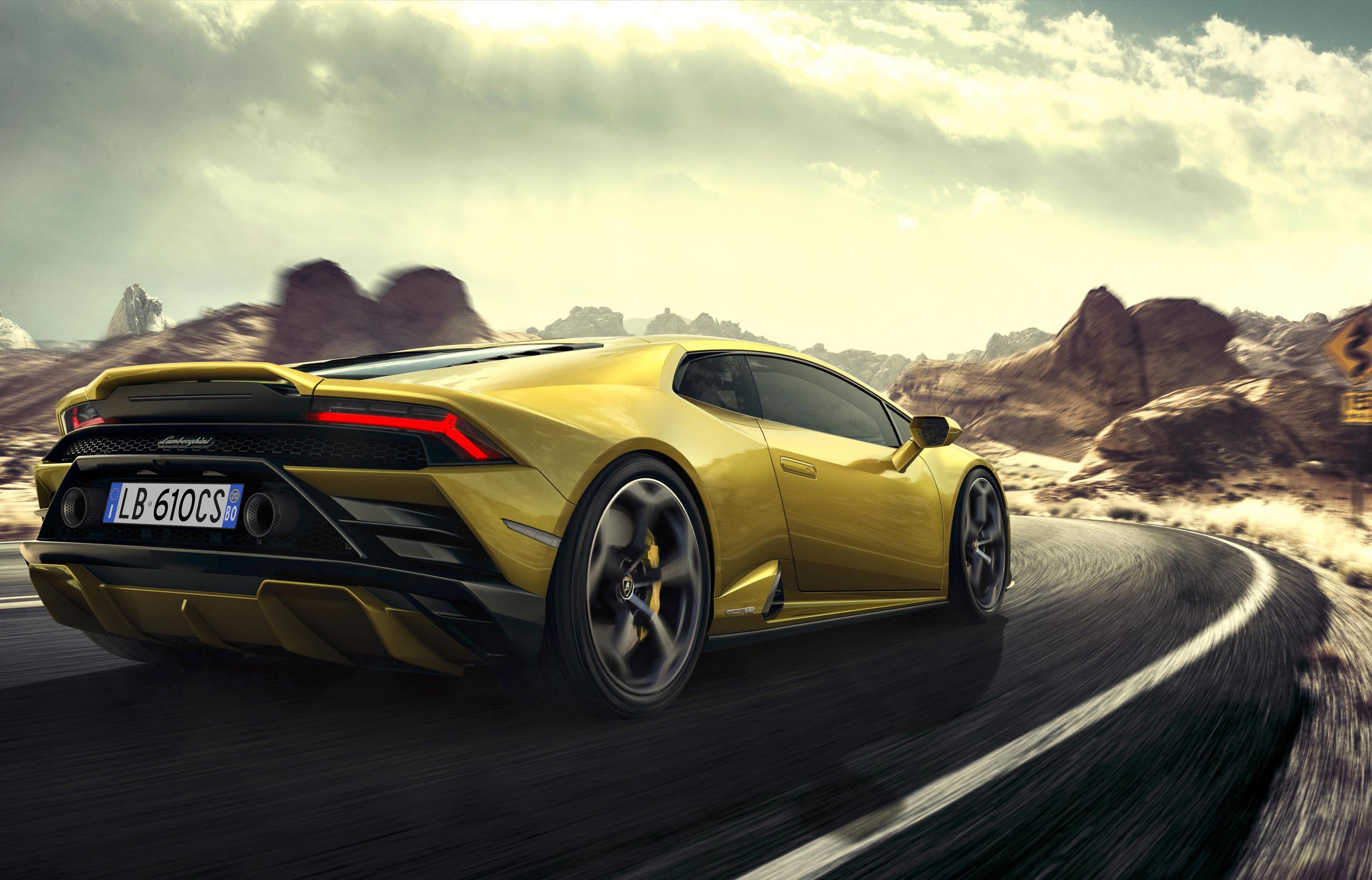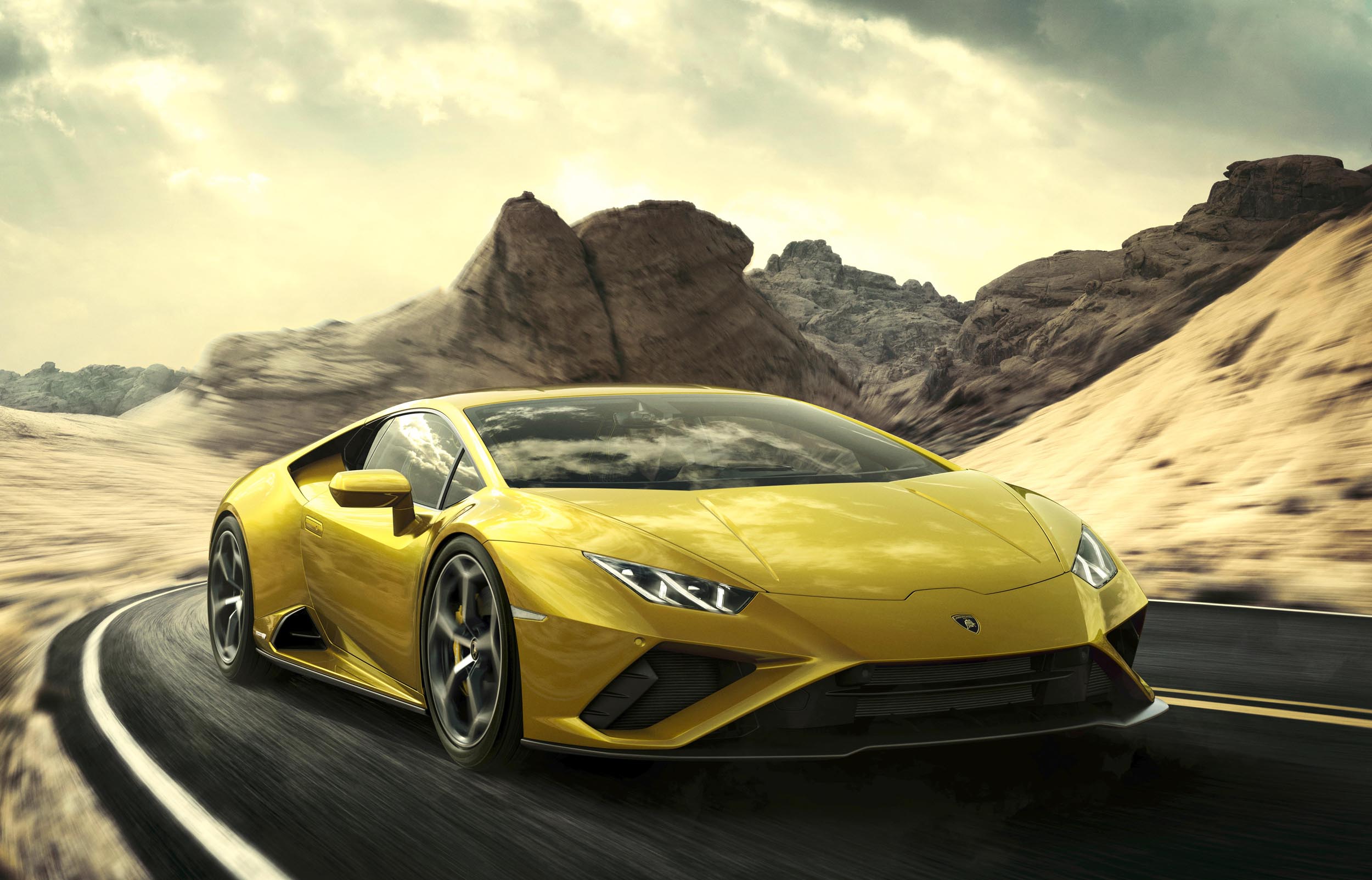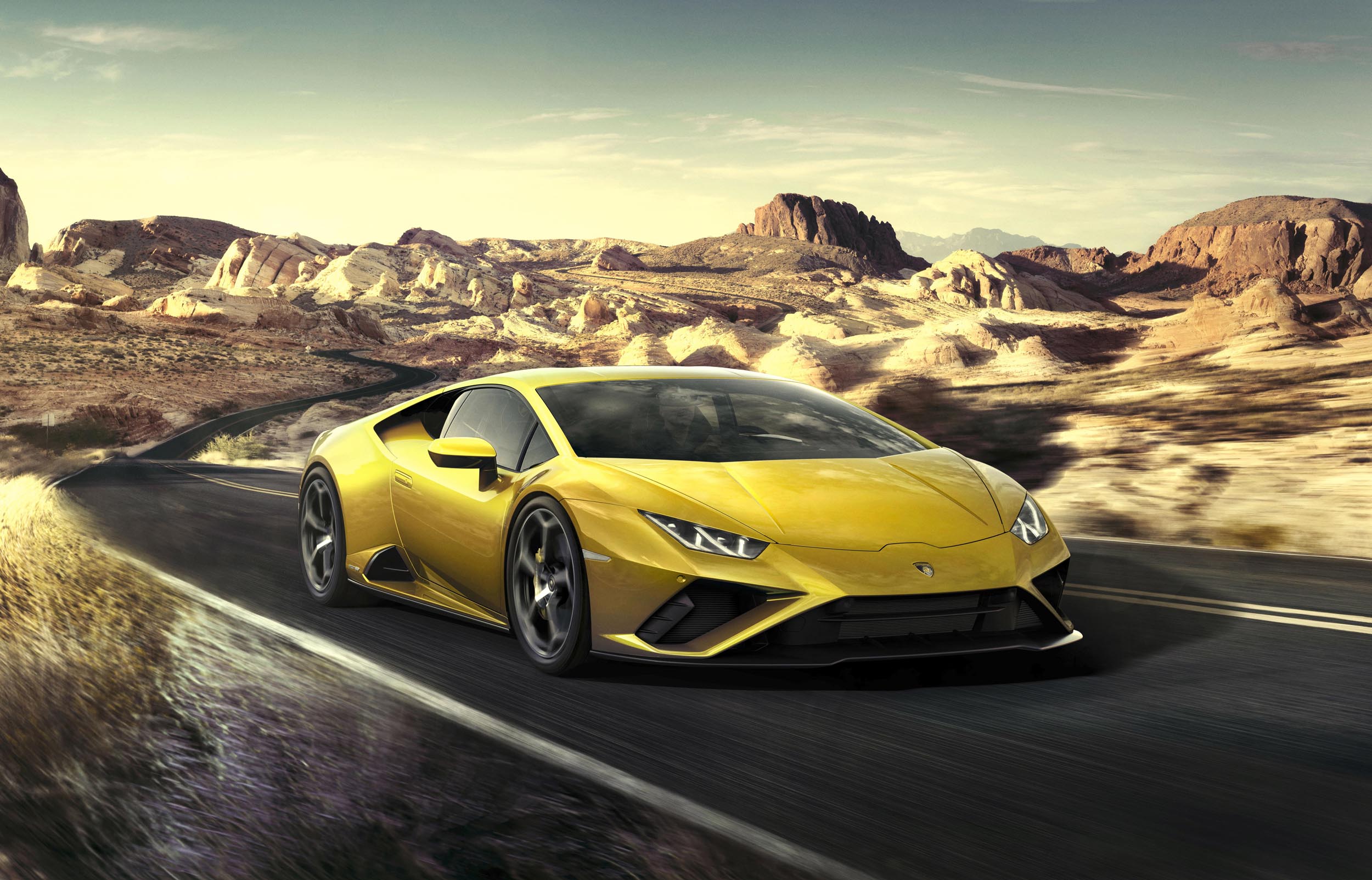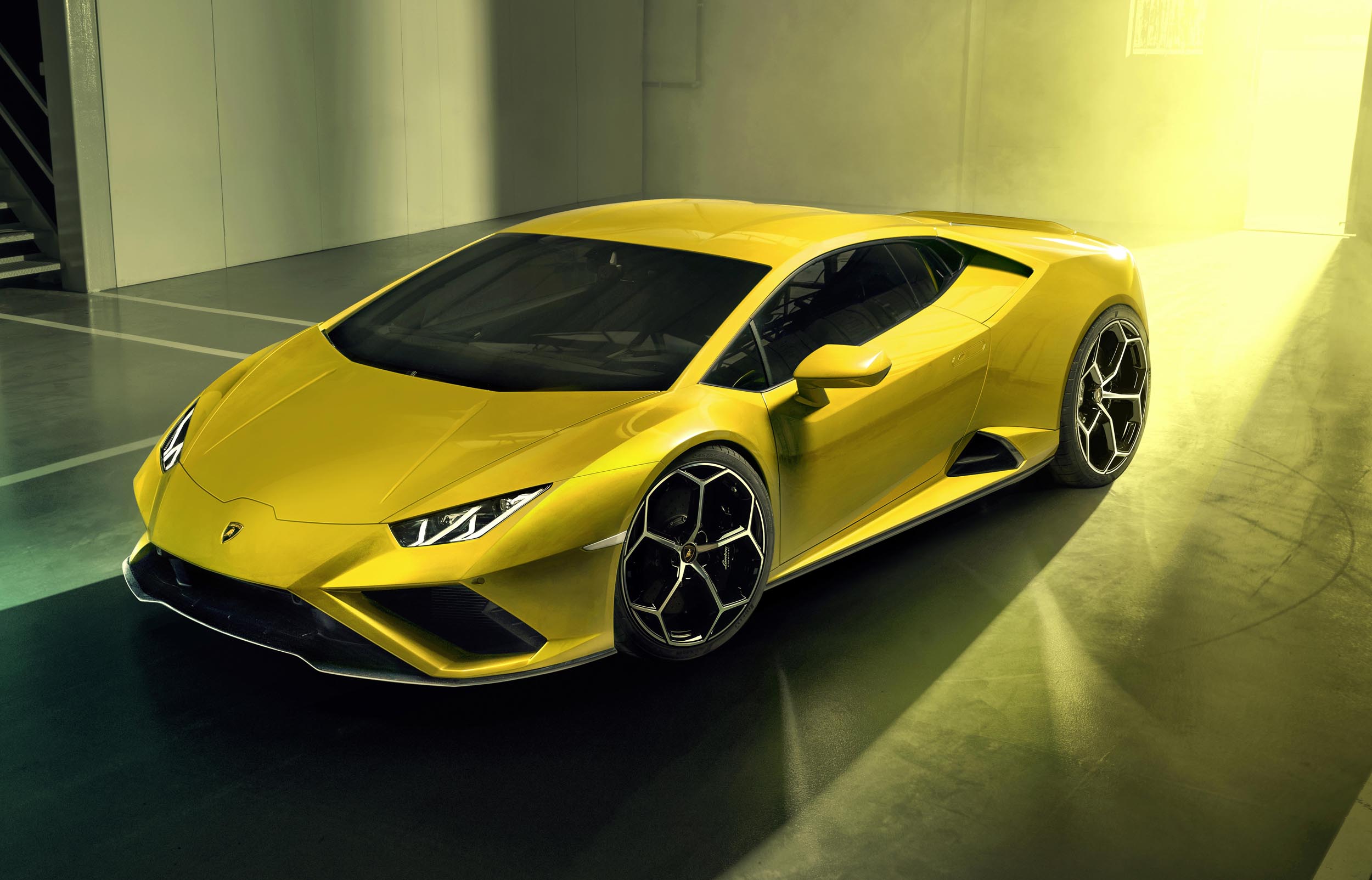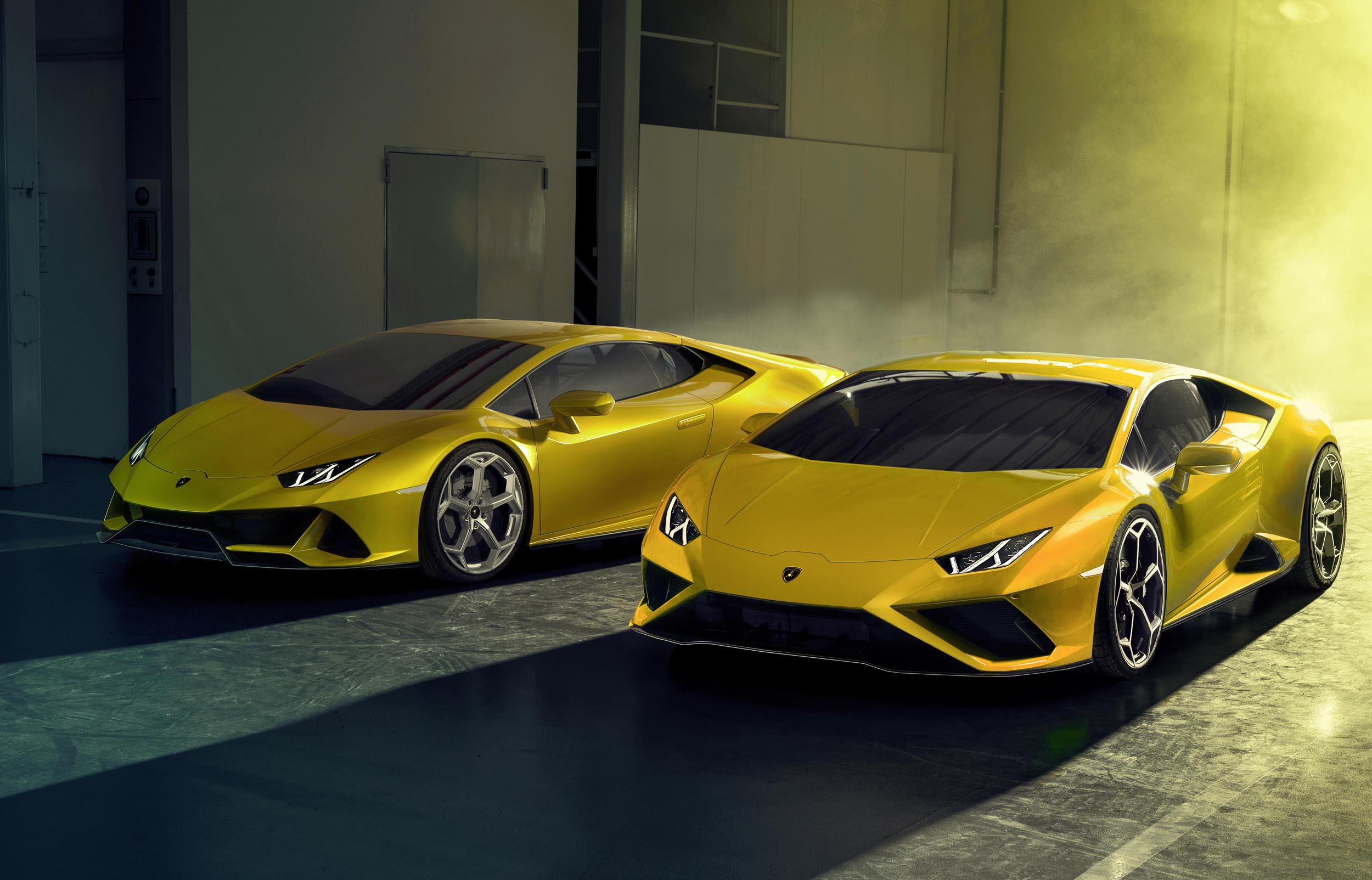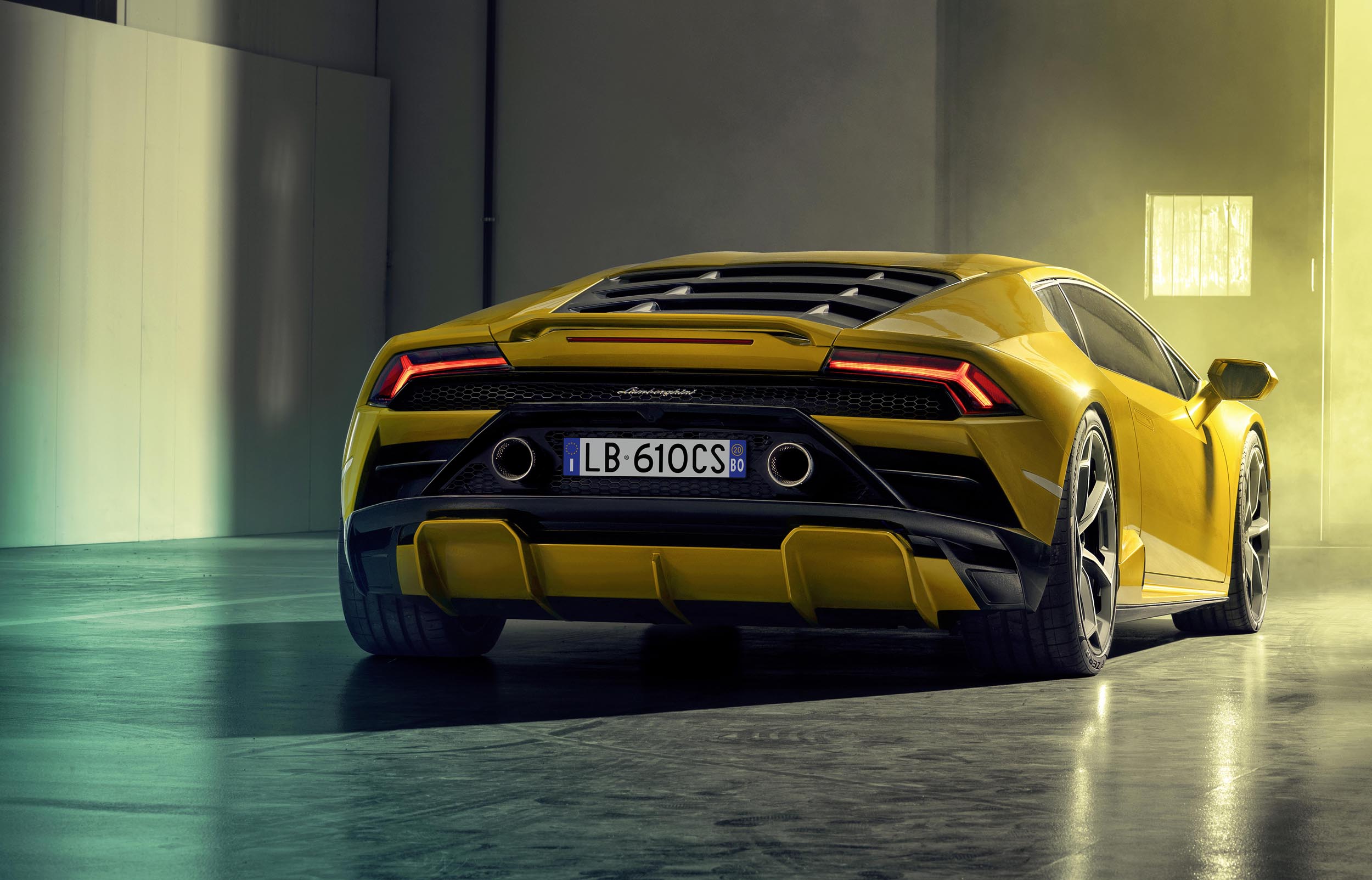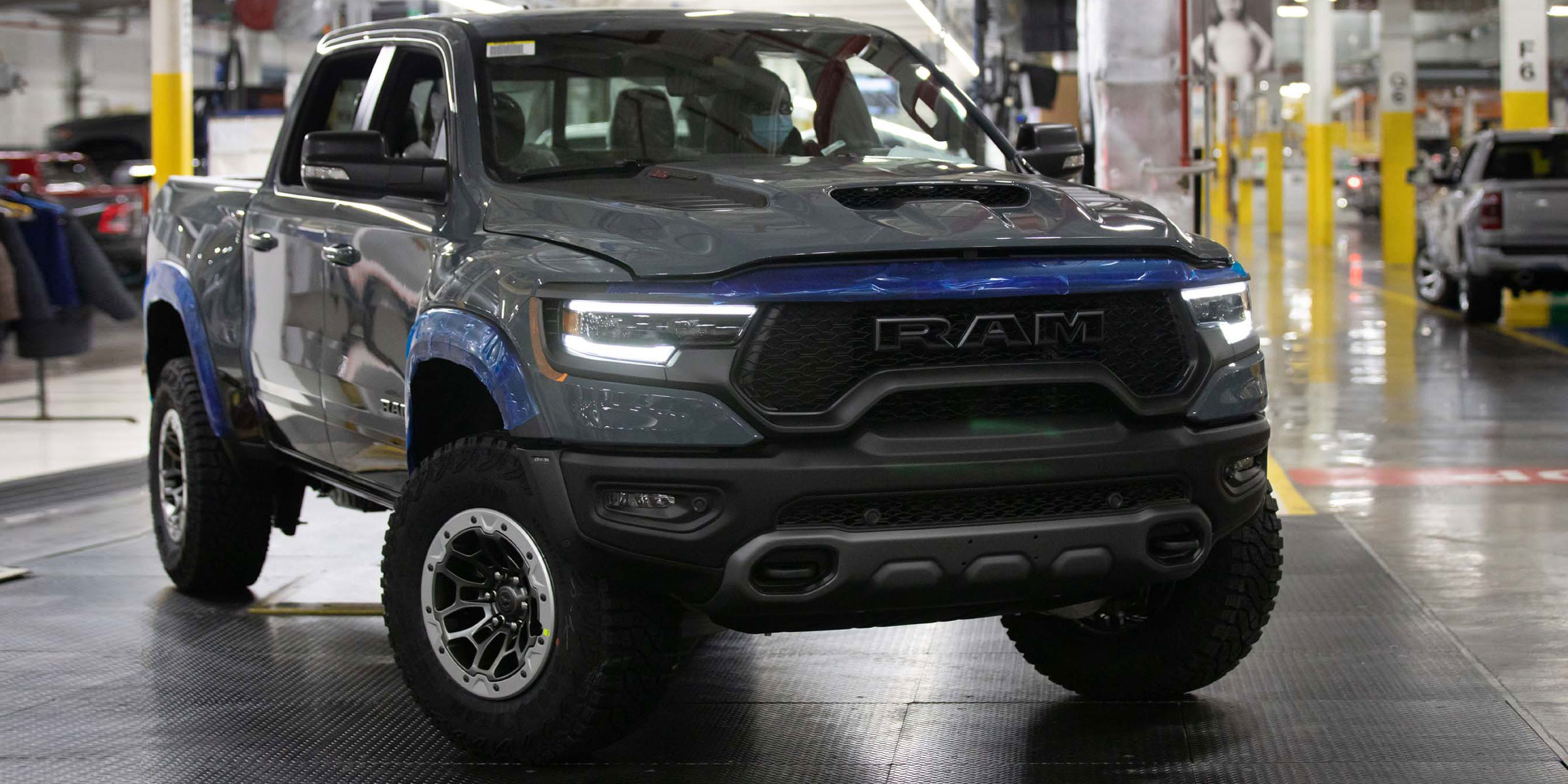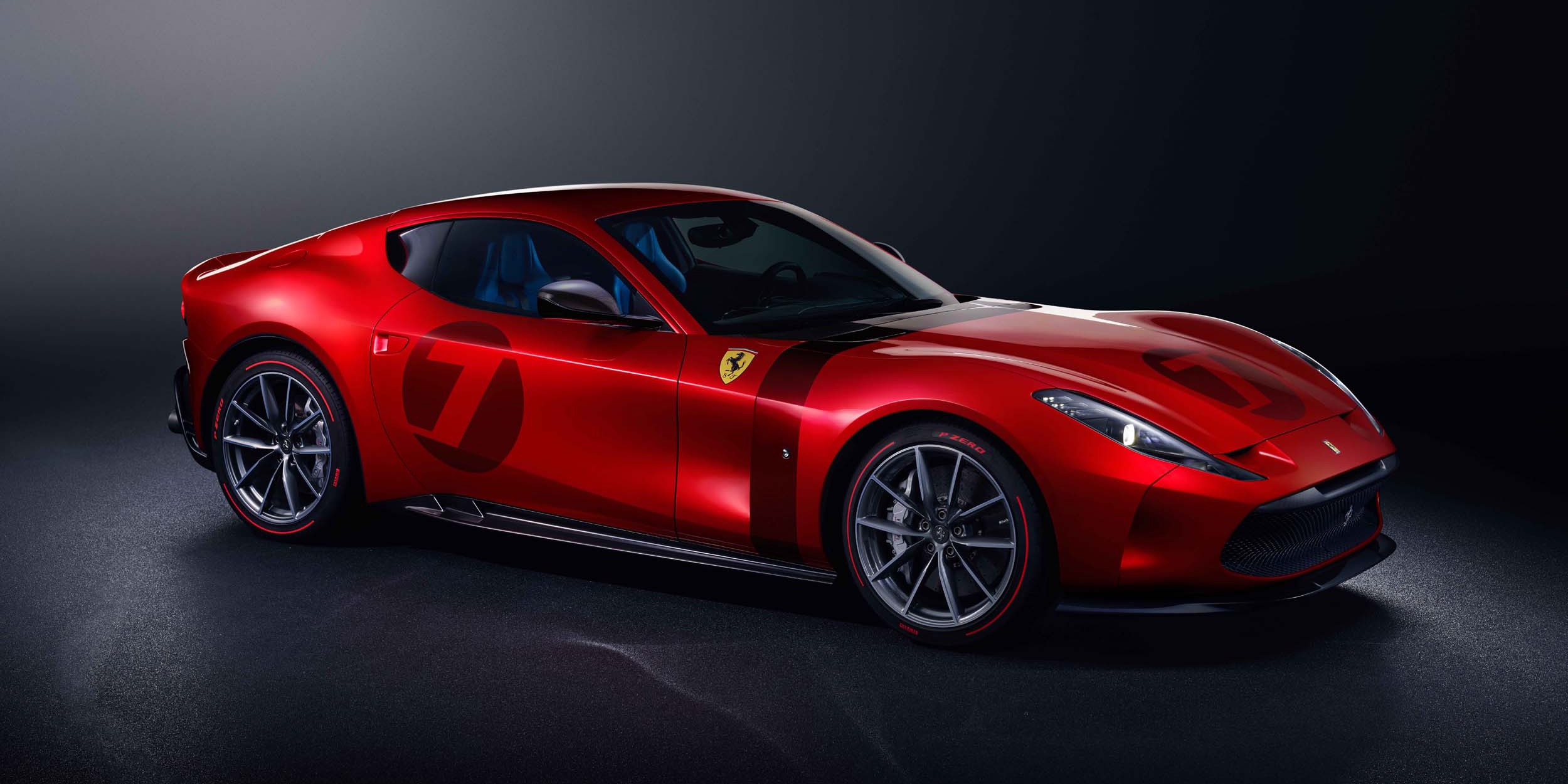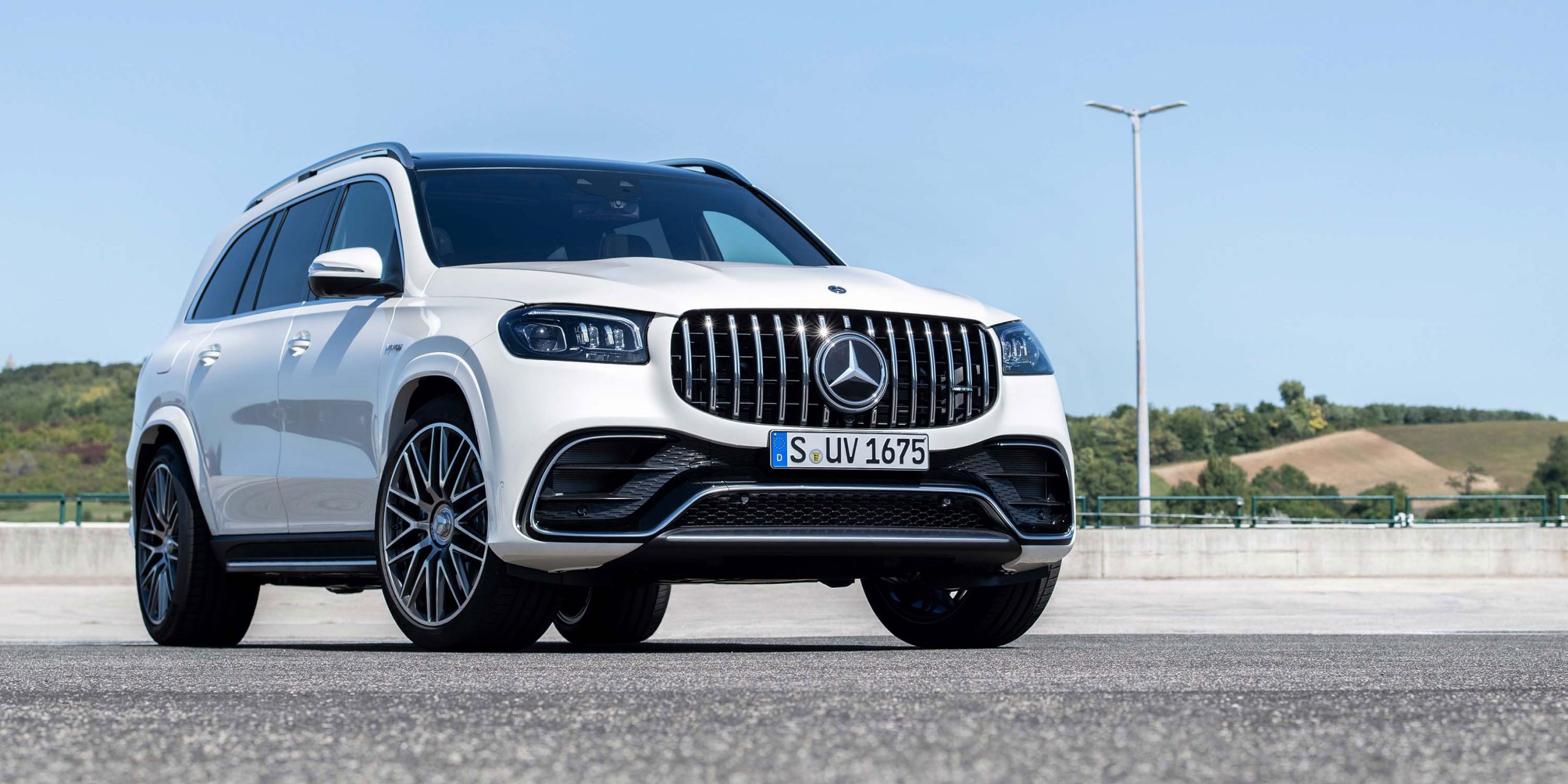New Lamborghini Huracán EVO Rear-Wheel Drive: The driver in total control of sheer driving fun
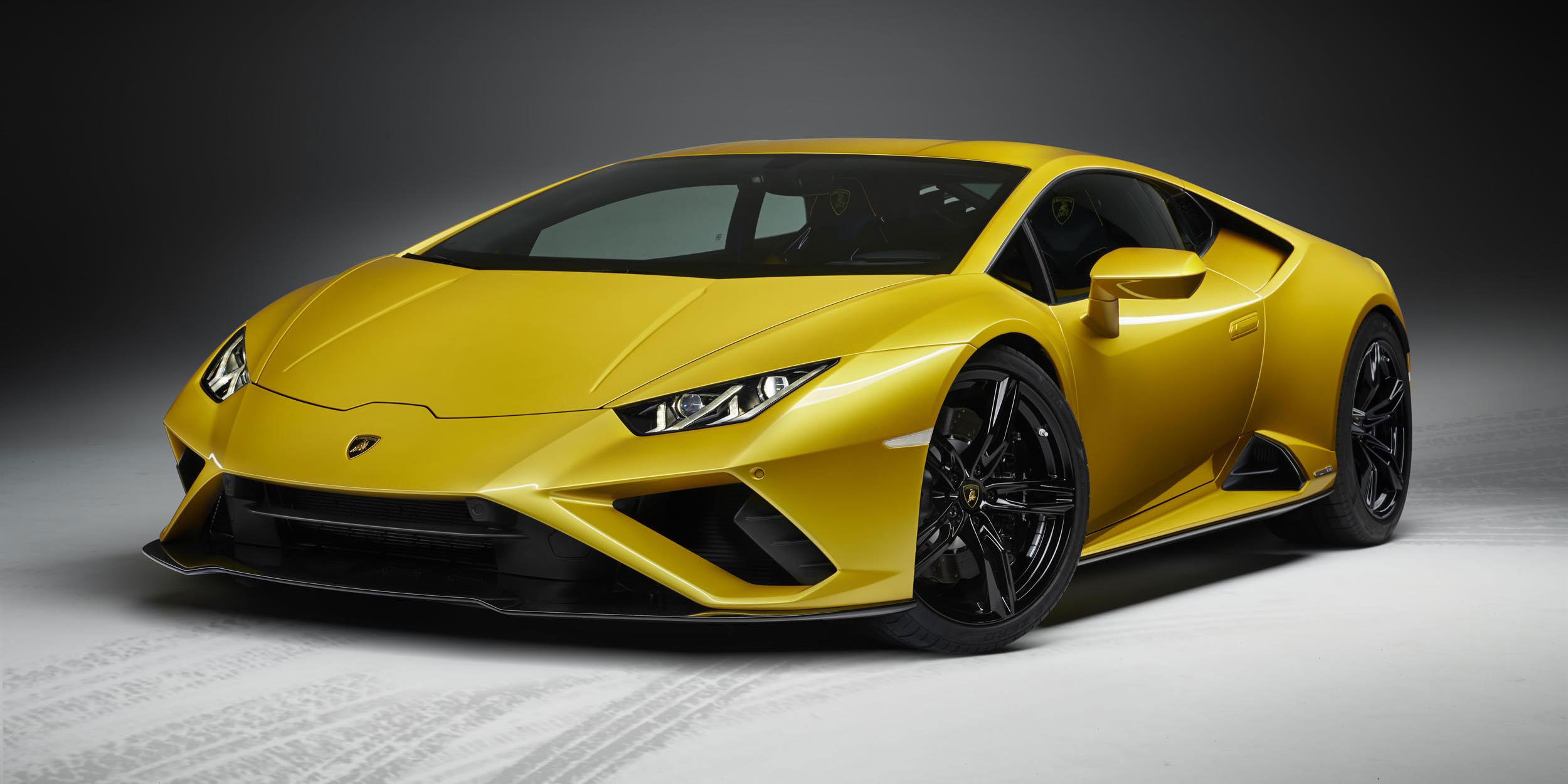
- Huracán EVO Rear-Wheel Drive (RWD) puts driver at the center of the driving experience
- 610 hp (449 kW) and 560 Nm of torque in lightweight chassis with specially calibrated Performance Traction Control System (P-TCS)
- Unique design signifies Huracán EVO RWD’s fresh and exciting delivery of pure driving emotion
- In-car connectivity with HMI touchscreen technology and infinite Ad Personam options
Sant’Agata Bolognese, 4 January 2020 – Automobili Lamborghini announces the Huracán EVO Rear-Wheel Drive (RWD): a visceral driving machine, delivering 610hp (449 kW) of power at 8,000 rpm and 560 Nm of torque at 6,500 rpm to a lightweight car with rear-wheel drive and dynamic steering for maximum driving fun. Weighing just 1,389 kg, the Huracán EVO RWD has a top speed of 325 km/h and accelerates from 0 to 100 km/h in 3.3 seconds. Despite its top-figure capabilities, the Huracán EVO RWD is not focused on straight-line speeds or lap records: with a unique new design, the Huracán EVO RWD proclaims its designationas an instinctive driver’s car.
“The Huracán EVO rear-wheel drive puts the car in the driver’s hands: the driving experience is delivered by the hardware,” says Stefano Domenicali, Chairman and Chief Executive Officer of Automobili Lamborghini. “This car reminds the driver of Lamborghini’s pure engineering origins: the driver is at the center of the Huracán EVO RWD’s performance, with unfiltered feedback and an emotive and more engaging driving experience controlled by the pilot. The Huracán EVO RWD performance relies on the harmony between man and machine: driving skills and the Huracán EVO’s RWD mechanics deliver perfectly balanced dynamics, physical feedback and a pure performance. TheHuracán EVO RWD enhances the V10 Huracán line-up with a model appealing to brand newcomers as well as those seeking sublime driving fun.”
ENGINEERED FOR DRIVING FUN
The V10 engine delivers more than just power to the rear-wheel drive set-up: the sound of the naturally aspirated power plant combines with the specially tuned traction control system to deliver the most emotive, fun-to-drive experience in both dry and wet conditions, and even snow. The new Performance Traction Control System (P-TCS) is calibrated specifically for the rear-wheel drive Huracán EVO, delivering torque even during the phase where the car is realigning following drifting or side-slipping.
Whereas a ‘normal’ traction control system delivers a sharp decoupling, waiting for a car to become completely stable before delivering torque again, the P-TCS car delivers torque in advance, avoiding a harsh torque cut and assuring better traction when exiting a corner.
The P-TCS intervention is calibrated according to the Huracán EVO RWD’s driving modes, selected via the steering wheel’s ANIMA button (Adaptive Network Intelligent Management: ‘soul’ in Italian). In STRADA, the P-TCS minimizes rear wheel slippage to ensure stability and safety in all conditions: with a more proactive strategy P-TCS manages torque delivery on low-adhesion surfaces.
In SPORT mode, the P-TCS maximizes the fun-to-drive experience: the rear wheels can slide and skate during acceleration, for easy drifting fun without compromising safety. The system recognizes conditions where the angle of oversteer increases rapidly and limits torque delivery to the rear wheels, allowing the driver to perfectly control and stabilize the car.
In CORSA, the P-TCS is calibrated to achieve the rear-wheel slip that optimizes the car’s traction and agility when exiting a corner, allowing the driver to maximize performance. The P-TCS improves smoothness of intervention by 30% compared to the previous Huracán RWD model; improves corner-exit traction by 20% and enhances oversteer by 30%.
The Huracán EVO RWD’s hybrid chassis integrates lightweight aluminum and carbon fiber with an aluminum and thermoplastic resin body, with a total dry weight of 1,389 kg giving a weight-to-power ratio of 2.28 kg/hp. With front/rear weight distribution of 40/60, the Huracán EVO RWD sits on double wishbone suspension with overlapped quadrilaterals and passive shock absorbers. The electro-mechanical, servo-assisted Lamborghini Dynamic Steering (LDS) is tuned specifically for the Huracán EVO RWD, ensuring maximum feedback. The seven-speed dual clutch gearbox ensures the fastest gear changes, with launch control for maximum acceleration from a standing start. The 19” Kari rims with specially-developed Pirelli P Zero tires are fitted with ventilated and cross-drilled steel brakes. As an option 20” rims and carbo-ceramic brakes are available.
FRESH DESIGN FOR PURE PERFORMANCE
The Huracán EVO RWD continues the V10 Lamborghini’s powerful design with new front and rear features, clearly differentiating it from its Huracán EVO 4WD stablemate.
The Huracán EVO RWD is characterized by a sculpted, purposeful persona, complemented by a new front splitter and vertical fins within the larger, framed front air intakes. The rear bumper in high gloss black incorporates a new diffuser unique to the Huracán EVO RWD.
Inside, the cockpit features a HMI 8.4” touchscreen in the center console of the car, controlling all aspects of the car’s functions as well as managing full connectivity such as telephone calls, internet access, and including Apple CarPlay.
Both inside and out, Lamborghini’s Ad Personam program provides unsurpassed options for color and trim personalization, allowing owners of the Huracán EVO RWD to impose their individual style and personality on their new Lamborghini driving machine. In order to emphasize the shape of the car the new color, Giallo Belenus (yellow), has been developed together with a dedicated leather and Alcantara color for the interior trim, matching the new exterior paint.
PRICE AND MARKET DELIVERY OF THE LAMBORGHINI HURACÁN EVO RWD
The first customers will take delivery of the new Lamborghini Huracán EVO RWD in spring 2020 at suggested retail prices as follows:
Europe EUR 159,443 (suggested retail price taxes excluded)
UK GBP 137,000 (suggested retail price taxes excluded)
USA USD 208,571 (suggested retail price taxes/GST excluded)
China RMB 2.540.000 (suggested retail price taxes included)
Japan YEN 24,126,941 (suggested retail price taxes excluded)
Technical Data – Lamborghini Huracán EVO RWD
CHASSIS AND BODY
| Chassis | Hybrid chassis made from aluminum and carbon fiber |
| Body shell | Outer skin made from aluminum and composite material |
| Suspension | Aluminum double-wishbone suspension |
| Springs and dampers | Steel springs and hydraulic dampers. “MagneRide” electromagnetic damper control available as an option |
| Electronic Stability Control (ESC) | ESC/ABS characteristics can be adjusted via ANIMA, ESC can be deactivated |
| Steering | Electromechanical power steering, LDS steering with variable steering ratio as an option |
| Brakes | Hydraulic dual-circuit brake system with vacuum brake servo unit, 8-piston aluminum calipers at the front, 4-piston aluminum calipers at the rear |
| Brake discs | Specially contoured steel discs, ventilated and cross drilled ∅ 365 x 34 mm front, ∅ 356 x 32 mm rear |
| Tires (standard) | Pirelli P Zero 245/35 ZR19 (front) – 305/35 ZR19 (rear) |
| Wheels (standard) | 8.5J x 19” (front) – 11J x 19” (rear) |
| Mirrors | Electrically controlled exterior mirrors |
| Airbags | Full size dual-stage front airbags. Full size lateral airbags. Knee airbags in specific markets. |
ENGINE
| Type | Ten-cylinder V, 90°, IDS+MPI dual injection |
| Displacement | 5204 cm3 (317.57 cu in) |
| Bore / stroke | Ø 84,5 mm x 92,8 mm (3.33 x 3.65 in) |
| Valve control | Intake and exhaust camshafts with continually variable adjustment |
| Compression | 12.7 : 1 |
| Max. power | 449 kW / 610 hp at 8,000 rpm |
| Max. torque | 560 Nm (413 lb. ft.) at 6,500 rpm |
| Emissions class | EURO 6 |
| Exhaust treatment | Two catalysts with lambda regulation |
| Cooling system | Water and oil cross flow cooling |
| Engine Management | Bosch MED 17 Master Slave |
| Lubrication | Dry sump |
DRIVETRAIN
| Type | Rear-wheel drive |
| Transmission | 7-speed LDF dual-clutch transmission, shift characteristics variable via ANIMA |
| Clutch | Double plate clutch ∅ 187 mm (7.36 in) |
PERFORMANCE
| Top Speed | 325 km/h |
| 0–100 km/h | 3.3 s |
| 0–200 km/h | 9.3 s |
| Braking (100-0 km/h) | 31.9 m |
DIMENSIONS
| Wheelbase | 2,620 mm (103.15 in) |
| Length | 4,520 mm (177.95 in) |
| Width | 1,933 mm (76.10 in) |
| Width(incl. ext. mirrors) | 2,236 mm (88.03 in) |
| Height | 1,165 mm (45.87 in) |
| Track front | 1,668 mm (65.67 in) |
| Track rear | 1,620 mm (63.78 in) |
| Turning circle | 11.5 m |
| Weight (dry) | 1,389 kg (3,062 lbs) |
| Weight/power | 2.28 kg/hp (5.02 lbs/hp) |
| Weight Distribution | 40% (front) – 60% (rear) |
CAPACITIES
| Fuel | 83 liters |
| Trunk | 100 liters |
| CONSUMPTION | WLTP Cycle |
| Combined | 13,8 l/100 km |
| CO2 emissions | 330 g/km |
